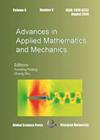非线性变阶分数阶随机微分方程Euler Maruyama方法的收敛性
IF 1.1
4区 工程技术
Q2 MATHEMATICS, APPLIED
引用次数: 0
摘要
本文首先证明了非线性变阶分数阶随机微分方程(VFS-DEs)解的存在唯一性定理。我们进一步构造了求解方程组的Euler Maruyama方法,并证明了该方法的均值收敛性和强收敛性。特别是,当分数阶数不再变化时,得到的结论与现有文献中的相关结论一致。最后,通过文末的数值实验验证了理论结果的正确性。本文章由计算机程序翻译,如有差异,请以英文原文为准。
The Convergence of Euler-Maruyama Method of Nonlinear Variable-Order Fractional Stochastic Differential Equations
. In this paper, we first prove the existence and uniqueness theorem of the solution of nonlinear variable-order fractional stochastic differential equations (VFS-DEs). We futher constructe the Euler-Maruyama method to solve the equations and prove the convergence in mean and the strong convergence of the method. In particular, when the fractional order is no longer varying, the conclusions obtained are consistent with the relevant conclusions in the existing literature. Finally, the numerical experiments at the end of the article verify the correctness of the theoretical results obtained.
求助全文
通过发布文献求助,成功后即可免费获取论文全文。
去求助
来源期刊

Advances in Applied Mathematics and Mechanics
MATHEMATICS, APPLIED-MECHANICS
CiteScore
2.60
自引率
7.10%
发文量
65
审稿时长
6 months
期刊介绍:
Advances in Applied Mathematics and Mechanics (AAMM) provides a fast communication platform among researchers using mathematics as a tool for solving problems in mechanics and engineering, with particular emphasis in the integration of theory and applications. To cover as wide audiences as possible, abstract or axiomatic mathematics is not encouraged. Innovative numerical analysis, numerical methods, and interdisciplinary applications are particularly welcome.
 求助内容:
求助内容: 应助结果提醒方式:
应助结果提醒方式:


